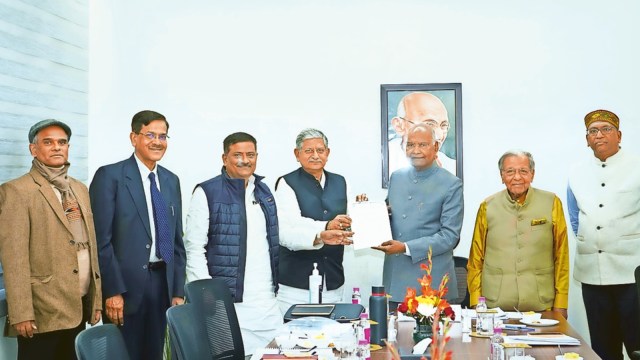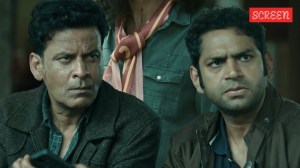JDU extends support to one nation, one poll
Wants local body polls to be held separately
 A JD(U) delegation, led by party leader Rajiv Ranjan Singh, meets Ram Nath Kovind, chairperson of one nation, one election committee, on Saturday. PTI
A JD(U) delegation, led by party leader Rajiv Ranjan Singh, meets Ram Nath Kovind, chairperson of one nation, one election committee, on Saturday. PTIThe JD(U) on Saturday submitted a memorandum supporting the idea of one nation, one election to the high-level committee, headed by former President Ram Nath Kovind.
The party, which recently entered into an alliance with the BJP in Bihar, said simultaneous polls for Lok Sabha and state Assemblies will save cost, provide policy continuity, help train focus on governance, increase voter turnout, reduce disruptions of daily life, streamline electoral process, provide level playing field to parties, reduce electoral violence and aide political stability.
It, however, underlined that the local body polls should not be held alongside elections to the Lok Sabha and the state Assemblies. All local body polls — municipalities and panchayats — should be held together but separately, the party said.
The memorandum has been signed by JD(U) general secretary Sanjay Kumar Jha and the party’s Parliamentary Party leader, Rajiv Ranjan Singh. The two leaders led a delegation that met Kovind, the chairman of the committee, on Saturday.
Notably, in September 2023, Bihar Chief Minister and JD(U) chief Nitish Kumar had cast doubts over the intention behind the government’s move on one nation, one election. Nitish had then told the media, “(Simultaneous elections) used to happen earlier. If they really wanted to do this, why didn’t they start with the Census? It used to happen every 10 years, but they didn’t do it. When this proposal comes in the House we will discuss. What is happening? …I have had my doubts since the beginning that they want to hold early elections. Because they see the Opposition coming together and they are feeling they are in danger.”
In the memorandum handed over to Kovind on Saturday, the party has quoted recommendations of the Law Commission in 1999 and 2018, and the 2015 report of committee led by E M Sudarshan Natchiappan on feasibility of simultaneous elections to highlight advantages of one nation, one election.
It said simultaneous polls could reduce the financial burden associated with frequent elections, as campaigning, logistics and security measures would be consolidated. Also, synchronised elections might lead to a more stable and continuous policy implementation as elected representatives would have longer terms without interruptions.
“Holding all elections together might boost voter turnout, as they could participate in a single voting event… Frequent elections can disrupt normal life, with continuous electoral cycles affecting administrative efficiency. Synchronised elections could minimise such disruption,” it said.
The memorandum has also underlined that coordinating elections on a national scale would lead to a more efficient and streamlined electoral process and could create a more level playing field among political parties, as they would all have the same time frame for campaigning and presenting their agenda.
“Once successfully implemented, the system of synchronised elections could simplify the electoral calendar, making it easier for citizens to understand and engage in the democratic process. Simultaneous elections might help in reducing election-related violence, as the security apparatus could be more effectively deployed for a single event,” it said.
The party has also argued that the potential for longer, uninterrupted terms for elected representatives could contribute to political stability and a more consistent governance framework.
“In the light of aforesaid advantages, JD(U) would like to extend its support to having simultaneous elections in House of People and State Legislature… The election for the third tier, that is, panchayats and municipalities should be held simultaneously but separately,” it said.







